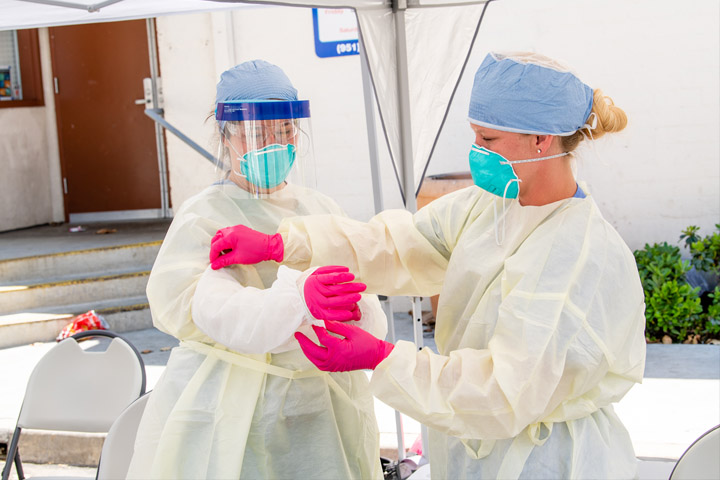Before a Pandemic
- Store additional supplies of food and water.
- Periodically check your regular prescription drugs to ensure a continuous supply in your home.
- Have any nonprescription drugs and other health supplies on hand, including pain relievers, stomach remedies, cough and cold medicines, fluids with electrolytes, and vitamins.
- Get copies and maintain electronic versions of health records from doctors, hospitals, pharmacies and other sources and store them, for personal reference.
- Talk with family members and loved ones about how they would be cared for if they got sick, or what will be needed to care for them in your home.
During a Pandemic
Limit the Spread of Germs and Prevent Infection
- Avoid close contact with people who are sick.
- Cover your mouth and nose with a tissue when coughing or sneezing. It may prevent those around you from getting sick.
- Wear cloth face coverings in public settings where other social distancing measures are difficult to maintain (e.g., grocery stores and pharmacies), especially in areas of significant community-based transmission. Face covering should:
- fit snugly but comfortably against the side of the face
- be secured with ties or ear loops
- include multiple layers of fabric
- allow for breathing without restriction
- be able to be laundered and machine dried without damage or change to shape
- Washing your hands often will help protect you from germs.
- Avoid touching your eyes, nose or mouth.
- Practice other good health habits. Get plenty of sleep, be physically active, manage your stress, drink plenty of fluids, and eat nutritious food.
- If you are sick, keep your distance from others to protect them from getting sick too.

Mosquito-Borne Disease
Rains and warm temperatures make Riverside a perfect breeding ground for mosquitoes. Mosquito season usually begins in the spring and slows down in the fall. Mosquitoes can carry diseases that are harmful to people, like West Nile and Zika viruses.
During mosquito season
The Northwest Mosquito and Vector Control District monitors mosquito populations. It also controls the mosquito population through education, habitat reduction, and treatment of larval and adult mosquitoes. But that doesn't totally eliminate the risk of disease. There are simple things you can do to help control the population and protect yourself. Mosquitoes need water to breed, so getting rid of standing water can go a long way.
Protect yourself from bites
- Wear long-sleeve shirts and long pants.
- Use insect repellent with ingredients like DEET, picaridin, IR3535, OLE, or PMD.
- Put sunscreen on before insect repellent.
- Keep doors and windows closed, or install screens to keep mosquitoes out of your home.
Control the population
- Remove trash and clutter like old tires, buckets, and tarps.
- Empty standing water from containers like pet dishes, children's toys, and flowerpots.
- Keep water fresh in containers like bird baths and kiddie pools.
- Clean gutters and catch basins.
- Call 311 to report illegal dumping, abandoned swimming pools, and water leaks.
Zika Virus
There are currently no locally transmitted cases of Zika in Riverside. The Zika virus spreads to people through mosquito bites and is sexually transmitted. The most common symptoms of Zika are fever, rash, joint pain, and conjunctivitis (red eyes). The illness is usually mild with symptoms lasting for several days to a week.
A pregnant woman can pass Zika virus to her fetus. Infection during pregnancy can cause a birth defect called microcephaly. Other severe fetal brain defects can occur too.
MORE RESOURCES
West Nile Virus
West Nile virus is the most common mosquito-borne illness in the United States and is found in Riverside County. Symptoms include headache, body aches, joint pain, vomiting, diarrhea, rash, fatigue, and weakness.
MORE RESOURCES
